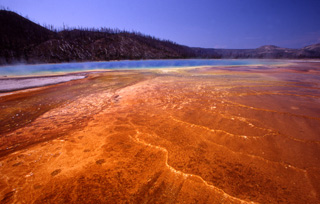
The red, orange, and yellow layers around the edges of this hot spring in Yellowstone National Park are produced by thermophilic ("heat-loving") bacteria, which thrive in extremely hot temperatures. (NPS photo by Jim Peaco, on Yellowstone Digital Slide File)
Instructor(s)
Dr. Celeste Peterson
MIT Course Number
7.345
As Taught In
Fall 2010
Level
Undergraduate
Course Description
Course Features
Course Description
Bacteria survive in almost all environments on Earth, including some considered extremely harsh. From the steaming hot springs of Yellowstone to the frozen tundra of the arctic to the barren deserts of Chile, microbes have been found thriving. Their tenacity to survive in such extreme and varied conditions allows them to play fundamental roles in global nutrient cycling. Microbes also cause a wide range of human diseases and can survive inhospitable conditions found in the human body. In this course, we will examine the molecular systems that bacteria use to adapt to changes in their environment. We will consider stresses commonly encountered, such as starvation, oxidative stress and heat shock, and also discuss how the adaptive responses affect the evolution of the bacteria.
This course is one of many Advanced Undergraduate Seminars offered by the Biology Department at MIT. These seminars are tailored for students with an interest in using primary research literature to discuss and learn about current biological research in a highly interactive setting. Many instructors of the Advanced Undergraduate Seminars are postdoctoral scientists with a strong interest in teaching.


